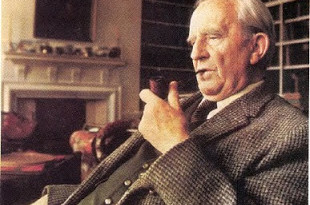
One of the modules I’m studying this semester is Tolkien’s Medievalism. J R R Tolkien was not only a fantasy writer, but also a distinguished scholar of medieval literature. His essay Beowulf: The Monsters and the Critics remains influential to this day. The rich depth of his writing comes from his love of language and of medieval storytelling, making him the modern writer that medieval scholars love to study.
He obviously did something right: The Lord of the Rings is the most popular novel of the 20th century, and also one of the most derided. J. R. R. Tolkien’s fantasy epic has sold over 150 million copies. The tale of Frodo the hobbit has won poll after poll across the world. But many critics howl in protest at its success, dismissing it as childish escapism.
I admit that it’s a story – no, a world – that you can lose yourself in. The hobbits, with their anachronistically English ways, are our companions on the journey into Middle Earth. It’s full of great characters, such as Frodo and Sam, Gollum and Gandalf. It’s packed with exciting events, from the flight from the Black Riders all the way through to the final confrontation above the Cracks of Doom.
But good storytelling isn’t childish. The people who worry most about “escape” are jailers. Great literature is more than just a good yarn, but not less. Far from being “mere escapism”, Tolkien used fantasy to deal with the big issues of the 20th century.
As Tom Shippey argues in Tolkien: Author of the Century, like George Orwell, Kurt Vonnegut, and William Golding, Tolkien turned to the fantastic to make sense of his experiences of modern warfare. Industrialization, global warfare, environmentalism and the nature of evil all loom large in the fabric of his novel.
Modernist writers responded to the horrors of the First World War and the barrenness of modern life with increasingly disjointed and formless writings. Writers like T. S. Eliot drew on ancient myth, but as broken fragments.
Tolkien, while sharing many of their concerns, did something very different. Drawing on his knowledge of Anglo-Saxon and Norse myth and legend, he wove a story of unique power and insight. When it mattered most, Tolkien reaffirmed the great values of human civilization: Good against evil. Unity over division. Self-sacrifice over power. And in doing so, he wrote a story that will speak not just to our time, but to all times.
I honestly believe that Lord of the Rings is going to be one of those rare stories that lasts, which like such works as The Odyssey, The Divine Comedy or Paradise Lost, will still be read and enjoyed hundreds of years from now.

If you’re interested in Tolkien, and especially in academic study of his writings, then you’ll probably share my enjoyment of
The Tolkien Professor podcast, in which Professor Corey Olsen of Washington College discusses his writing in a lively and engaging way, with lectures, interviews, Q&As and readings.
There’s a veritable industry of Tolkien scholarship. Some titles that are good introductions are the aforementioned Tolkien: Author of the Century by Tom Shippey, The Tolkien Fan’s Medieval Reader by Turgon and The Keys to Middle Earth: Discovering Medieval Literature through the fiction of J R R Tolkien by Stuart Lee and Elizabeth Solopova. Looking at the medieval influences of Tolkien (and other writers such as C S Lewis) is an easy way to get into medieval literature, which is itself fascinating and wonderful.





